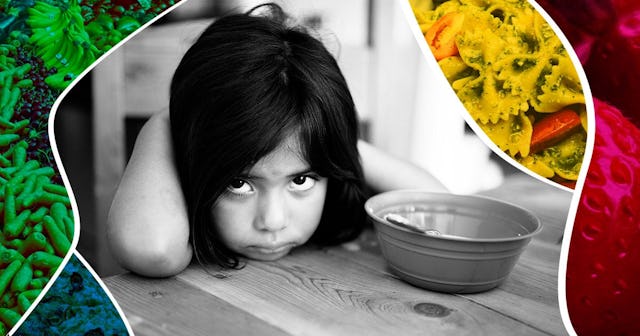All Of My Kids Are Picky Eaters, And It's Probably My Fault

Last night, my wife made the most amazing salmon. It was seasoned just right. We had a side of rice, with organic asparagus. The whole house smelled amazing, and I have no doubt that if we had paid for this meal at a restaurant, it would have been top dollar. And yet, all three of my children, ages 13, 10, and six looked at that meal like it was a rancid hot turd being pulled from the oven. You know this look. All parents do.
And like we always did, we went through the motions. We reminded them that if they didn’t try it, they wouldn’t get a dessert. We told them it was wonderful, and asked them to not make their usual icky sounds, and gagging motions as we set it on their plate. Eventually, we tried to pressure them into it. Nothing. They didn’t take a bite.
My oldest two said they would rather eat air, which I will admit, was a bold statement that my wife did not appreciate. And my six-year-old just looked like she was on the verge of tears. All of it was a pretty emotional event looking back, and it turns out all the fanfare around trying new things might actually be the reason my children are such incredibly picky eaters.
As much as I want to blame my kids for our dinnertime woes, the journal Pediatrics published a five-year study recently on the subject, and it sounds like the problem isn’t my children. It’s me. Now I know that sounds harsh, so perhaps I should back it up just a bit and say, the problem is how I approach my children about trying new foods.
Hello World/Getty
Nancy Zucker, co-author of the study and a Duke University School of Medicine associate professor of psychiatry, told CNN that the pickiest of eaters probably have “thousands of negative memories about food,” such as conflict over meals, unexpected tastes, and discomfort. And according to the published study, we need to let go of our need for a child to taste something, and focus instead on making dinner time a pleasant experience. “Don’t force kids to clean their plate,” she wrote in her study. “Don’t make them sit at the dinner table until they eat a certain amount of the food. And avoid bribing with food.”
Now I don’t want to speak for everyone, but I have for sure tried to force my kids to eat all the vegetables. I have tried to force them to eat chicken, and fish, and a number of other homemade meats that weren’t pressed into the shape of a dinosaur. But the truly sad part about all of this is that I, too, am a very picky eater. I like my food simple and bland, so obviously I’m not the best example. And when I think back to my childhood in relation to food, I think what I felt the most is shame. I felt there was something wrong with me. And I felt fear, because I knew I was going to be faced with confrontation from my mother when it came to trying new food. And let me just say, shame, anger, and confrontation do not exactly line up with joyful eating, or wanting to try something new and enjoyable.
Ultimately, what these doctors are arguing is that we should stop trying to force our children to try something because we know they will like it, which is definitely a tough green bean to swallow. Instead, we should focus on creating an enjoyable environment where food options are offered — even placed on the child’s plate — but the pressure to eat them is taken off the table.
Pediatrician Dr. Tanya Altmann, author of What to Feed Your Baby, has a list of “11 foundation foods” she believes will help children learn to love healthy food. She told CNN in response to this study, “Let your infant lean in and open his mouth when he wants to eat. Don’t force feed or play airplane games — that doesn’t help.” But most importantly, she recommends that you don’t give up on a particular food. One of the best practices for parents dealing with picky eaters is to expose your child to the food multiple times, but to always do it without stress.
In fact, this study, published in the international research journal Appetite, suggests that kids may need up to 12 exposures to new food to begin to consider it. An exposure is not necessarily eating the food, but rather looking at it or helping to prepare it. If you interrupt those pleasant exposures with a negative experience, it is very easy for a child to prematurely put the food into the “I’m never eating this in a million years,” category.
As a father of three very picky eaters, I wonder if I’m actually a huge part of the problem. And after researching the subject, I just might be. But it sucks to feel that way; we parents have enough to deal with already. So I’m going to use this information as a license to just take the pressure off. I’m going to expose my children to lots of different kinds of foods, healthy and otherwise. I’m going to ask them to engage with it, look at it, cook it, touch it, and suggest they try it. But if they don’t, I’m not going to stress about it. I’m not going to take it personally.
And fingers crossed, this will hopefully take the stress off my children just enough for them to try my wife’s amazing salmon. Because they’re really missing out.
This article was originally published on